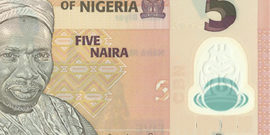The Central Bank of Nigeria (CBN) is reportedly considering a move from polymer banknotes back to traditional paper.
Low denominations banknotes have been issued with a polymer substrate – the N5, N10, N20 and N50 – since 2006 after the CBN signed a deal with Australia’s Securency International to print low value, high circulation Naira banknotes in polymer. CBN spokesperson Ugochukwu Okoroafor stated:
“Polymer has been on a test run since 2007. This explains why we did not go the whole hog by printing all the notes in polymer… We soon discovered that the [polymer] notes easily fade out because of our peculiar hot climate in Nigeria… making them look tattered when in use over time”
Polymer banknotes are initially more costly to produce than paper banknotes, but their increased durability is said to result in the notes lasting longer in circulation and consequently are more cost effective for Central Banks. The CBN claims this is not the case with their polymer banknotes, resulting in a higher than anticipated number of banknotes failing fitness tests earlier than expected and thus requiring replacements to be manufactured.
Troubled Securency International (bought by Innovia Security earlier this year) was reported to have supplied Nigeria with 1.9 billion Guardian® polymer-based notes between 2006 and 2008, but there have since been well publicised allegations that they bribed foreign officials to secure contracts, including Nigeria.
Polymer based banknotes are currently used in 23 countries, and the trend in their uptake is expected to continue. Nigeria will be the first to revert back to traditional banknote paper if the CBN goes ahead.







